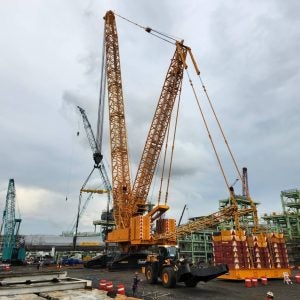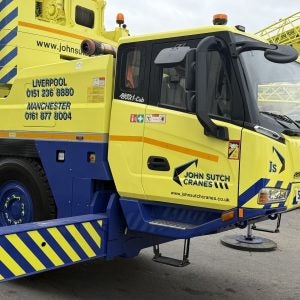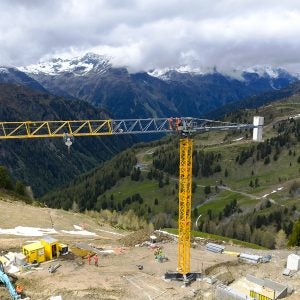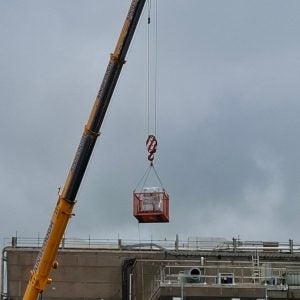UK rental company Baldwins Industrial Services Ltd has been cleared by a jury of responsibility for one of its cranes crashing into a house while working on the refurbishment of Boston Manor railway station in west London.
The jury at Isleworth Crown Court took less than an hour to find the company not guilty of breaching health and safety regulations.
Two other companies, the client London Underground and main contractor Tilbury Douglas Construction have admitted the charge and will be sentenced at a later date.
The court case arose from an incident in the early hours of Sunday 28 June 1998 when a 90t Liebherr mobile crane, supported by timber matting, sank into the wet ground. Its jib ended up across four railway lines and a road, and crashed through the roof of a house and came to rest in a bedroom where a child, Ruth O’Sullivan, was sleeping. She was unharmed.
The court heard that the accident was caused by the failure to use metal spreader plates under the crane and the reliance on timber sleepers following a week of rain. Counsel for Baldwins, Robert Weir, argued successfully that Baldwins did everything “that could be reasonably expected” in relation to the metal plates.
“There was nothing wrong with the timbers and they were not the responsibility of Baldwins – they were the responsibility of Tilbury Douglas,” he said. “There is common ground between the parties that the ground was unsuitable – and that was the responsibility of Tilbury Douglas. London Underground employees have also accepted they were responsible for supervising the preperation of the ground for Tilbury Douglas.” Weir continued: “The real issue was the use of the metal spreader plates. It is the duty of the crane operator to conduct his work so as to ensure that the metal spreader plates are used.” But he added that Baldwins had ensured that metal spreader plates were supplied with the crane and had ensured that the operator knew that he had to use them. Baldwins’ training programme covered this matter comprehensively.
The crane’s operator, William Brown, had previously explained to the court why he had gone against his training and not used metal spreader plates. “The site were not happy with the time it was taking to rig the crane. We had only a small time in which to work. Possession time from London Underground [for the railway line] was about two hours working and the rigging time was eating into the working time. Tilbury Douglas were not very happy losing 20 to 30 minutes to rig the crane and 20 to 30 minutes to de-rig it. I had that conversation with the site agent. Thereafter we never used spreader plates,” said Brown.
Richard Baldwin, chairman and chief executive of Baldwins said after the verdict: “We are delighted that our defence in this unfortunate incident has been fully vindicated.” He also offered his apologies and sympathy to the O’Sullivan family.






